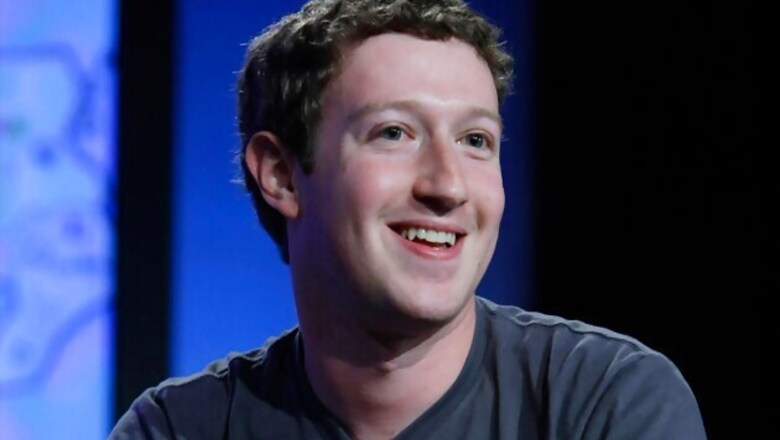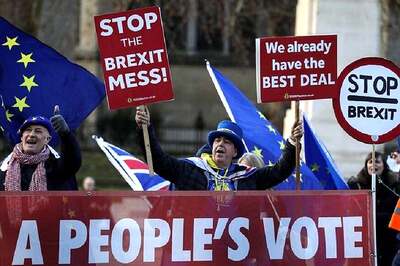
views
New York: Facebook founder Mark Zuckerberg has joined the growing chorus against the proposed anti-piracy bills in the US, saying the two "poorly thought out laws" are not the "right solutions" to the problem of piracy but will only harm the Internet.
Zuckerberg posted his remarks against the Protect IP Act (PIPA) and the Stop Online Piracy Act (SOPA) on his social networking website's wall.
Within two hours, his post got over 280,000 likes.
"The Internet is the most powerful tool we have for creating a more open and connected world. We cannot let poorly thought out laws get in the way of the Internet's development. Facebook opposes SOPA and PIPA, and we will continue to oppose any laws that will hurt the Internet," he wrote.
Zuckerberg said the world today needs political leaders who are "pro-Internet".
Noting that social networking website Facebook takes online piracy and copyright infringement very seriously, he said rogue foreign sites that pirate American intellectual property or sell counterfeit goods pose significant problems for the US economy.
However, the two pieces of legislation in front of the Congress are "not the right solution to this problem, because of the collateral damage these overreaching bills would cause to the Internet," Zuckerberg said.
"The two legislations could create very real problems for Internet companies like ours that are a primary driver of innovation, growth, and job creation in the 21st century economy," he said.
The bills contain overly broad definitions and create a new private cause of action against companies on the basis of those expansive definitions, which could seriously hamper the innovation, growth, and investment in new companies that have been the hallmarks of the Internet, the Facebook founder said.
Meanwhile, it was a black day for most websites as they joined the protests to stop the Internet piracy legislation being considered by the US Congress.
While Wikipedia shut down completely for the day, Google blotted its logo with a black strip.
Social news site Reddit said it will shut down for 12 hours while Cheezburger, which has a network of 50 sites including the seminal ICanHasCheezburger as well as Fail Blog, Know Your Meme and the Daily What, also joined the strike.
Classifieds site Craigslist put up a black homepage that gave users information about the laws and condemned "corporate paymasters" to "keep those clammy hands off the Internet."
The online protests were gradually having their impact as key co-sponsors of the legislation withdrew their support for the bills.
Republican senator Marco Rubio of Florida led the pack saying he will not back the anti-Internet piracy legislation he had co-sponsored.
Texas Republican Senator John Cornyn followed in his footsteps and urged Congress to take more time to study the legislation.
Republican Senator Orrin Hatch of Utah, one of the Senate bill's original co-sponsors, called it "simply not ready for prime time" and withdrew his support.
Rubio wrote on his Facebook page, "As a senator from Florida, a state with a large presence of artists, creators and businesses connected to the creation of intellectual property, I have a strong interest in stopping online piracy that costs Florida jobs."
"However, we must do this while simultaneously promoting an open, dynamic Internet environment that is ripe for innovation and promotes new technologies," he said.
"Stealing content is theft, plain and simple, but concerns about unintended damage to the Internet and innovation in the tech sector require a more thoughtful balance, which will take more time," Rubio said.
The SOPA is up for consideration in the US House of Representatives while PIPA is in the Senate. Voting on the bills will begin on January 24.
The bills have been backed by major American media companies, with the Motion Picture Association of America the legislation's main backer.
It estimates that 13 per cent of American adults have watched illegal copies of movies or TV shows online, which leads to billions of dollars in losses for the media companies.
The legislation would allow the US Justice Department to seek a court order requiring US Internet providers to block access to foreign pirate websites.
It could also seek a court order requiring credit-card processors to stop processing payments to the sites.
Both bills would also allow Hollywood studios and other content owners to take legal action against websites that host pirated material.
Explaining its position on the anti-piracy bills, Facebook expressed concern over the provisions in the bills that could "chill free expression or weaken the Internet's architecture."
The website said while the concerns of the film, music industries as well as other content creators and trademark owners over piracy is understandable, it must be ensured that Congress "does not do anything in this area that threatens the security of the Internet, hampers US innovation or competitiveness, or sets harmful precedents for other governments to follow."
The solution to combat piracy, which eats into revenues of the media companies, could be found through a "constructive dialogue" and not by resorting to a rushed process, Facebook said.
"It's too important not to take the time to get it right," the website said adding that it has been working with lawmakers for months on better alternatives to the current proposals.
"We have a reporting system in place and a trained team dedicated to handling rights owner notices," it said.




















Comments
0 comment